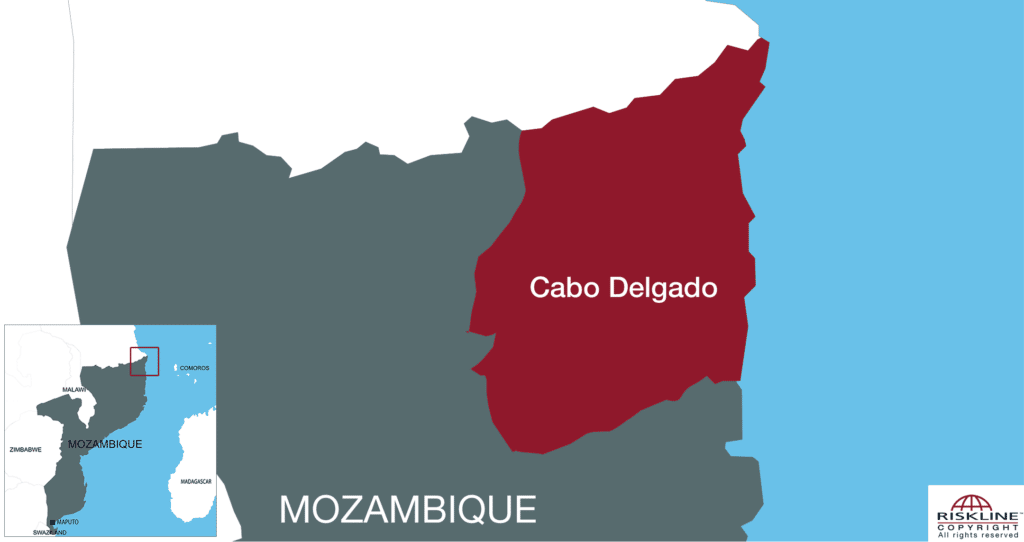When suspected militants from the Islamist Ahlu Sunnah Wa-Hamo (ASWH, locally known as al-Shabaab – in reference to the Swahili word ‘youth’ – but with no confirmed operational links with the Somali terror group) attacked Monjane, a town in northern Mozambique’s Cabo Delgado province, beheading 10 people and burning several houses on 27 May, international business concern peaked, particularly due to the safety of the extractive potential of the region. The ocean floor off Cabo Delgado is known to hold vast reserves of natural gas, and the emergence of a new Islamist terror group would not just affect Mozambique, but the whole global energy industry, threatening potential billions in investments. While ASWH militants have been active for some time near the border with Tanzania, radical Islamist activities remained largely unknown in Mozambique, especially in the coastal areas of Cabo Delgado, where members of ethnic groups such as the Makonde and the Makuwa have long been living peacefully with Arab, Indian and European immigrants.
ASWH formed in 2015 but fully emerged on the international radar in October 2017 after 30 militants stormed the town of Mocimboa da Praia in Cabo Delgado, attacking a bank and three police stations, killing four police officers and bank guards, and gaining control of the town for nearly a day before withdrawing. While Mocimboa da Praia is a small town in a remote portion of northern Mozambique, the presence of energy resources in the province gave rise to concern for both the country’s security environment and multinational corporations’ ability to continue with natural gas exploration. While the gas fields are located offshore, plans to turn cities located along the coast into major natural gas export terminals could be stalled indefinitely.
The group has an estimated force of between 350 and 1,500 members and it allegedly originates from a youth movement ideologically linked with regional jihadist theologians such as Aboud Rogo, an imam and founder of a Kenyan movement that declared allegiance to al-Qaeda and was briefly associated with Somalia’s al-Shabaab. Rogo’s killing – possibly at the hands of local police – in Mombasa in August 2012 scattered his followers, with a few allegedly moving into Tanzania and northern Mozambique. The human geography of Cabo Delgado also plays a fundamental part in its recruitment, with northern Mozambique being the poorest region of the country, enabling the militant group to attract many jobless and frustrated youths. Moreover, its activities benefit financially from rampant ruby, ivory and timber trade, which is particularly robust across the province. Nevertheless, ASWH remains largely a local phenomenon with very particular historical and social dynamics.
While ASWH militant cells have claimed responsibility for an array of attacks since late 2017, no international terror links or significant operational and strategic capabilities were pinned to the group. They have gained a lot of media attention, but the recent attacks do not differ considerably from what the region has known over the past decades – an entrenched vicious circle of disregard and concomitant resentment. If terrorism is on the rise in Mozambique, it is only terrorism exploiting a situation that existed on the ground for years.
Additionally, is it unlikely that ASWH enjoys sufficient financial support through its smuggling activities to pose an immediate threat to the region. This was illustrated by the nature of the attacks, which involved stealing food, money and weapons, the use of limited weaponry – most of the militants were armed with machetes – and a clear lack of organised leadership between militant cells. ASWH seems interested in more than fighting perceived oppression and creating an Islamic polity, but it still lacks public support for a wider uprising. The group continues to show little capacity to seize and control territory, solely focusing on hit-and-run insurgent attacks with limited operational and tactical capacities.
The organisation demonstrated sheer ruthlessness, but its lack of coordination or international support indicates that multinational companies or large businesses operating in the region will find no difficulties in properly protecting assets and energy installations through straightforward security measures used in similar hotspots around the world. In this perspective, the insurgency would be more likely to delay rather than disrupt industrial developments in the region. Attacks will make investment more expensive due to an increase in security measures, lessening profits, but do not have the power to hinder the expansion of foreign investments and the exploitation of natural resources in the near- to medium-term. However, soft targets like aid and development organisations or foreign travellers in the region remain vulnerable. Local government facilities and populations will similarly represent easier targets for the militants.
For now, the Mozambican government has denounced the attacks as mere criminal and localised violence, separate from guerrilla warfare and brought by “foreign troublemakers” from neighbouring Tanzania. It also vowed a “firm and relentless” response, arresting hundreds of suspects, deploying additional troops to the province and signing security deals with neighboring countries. Nonetheless, Cabo Delgado province’s considerable size and geographical position leave little possibility for tenable control of the area by government security forces and will likely strengthen ASWH’s narrative, fueling further recruitment, particularly as unemployment remains high in the north. The group’s possible growth — as well as Maputo’s reaction — will merit close attention over the months and years to come. Though it could remain localised and negligible, the involvement of any third party could potentially tip the balance one way or the other.















